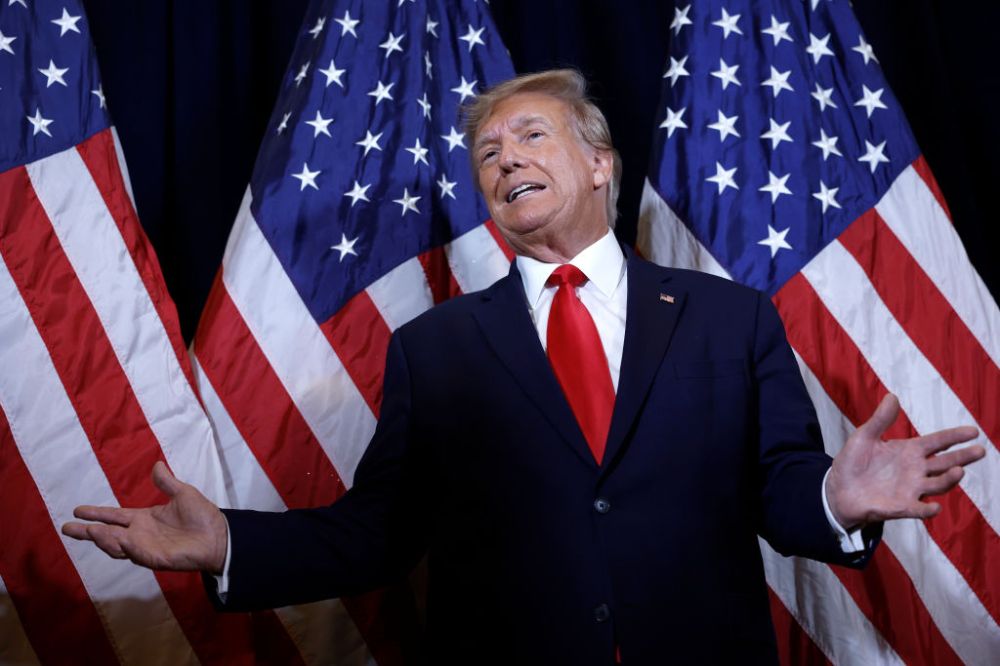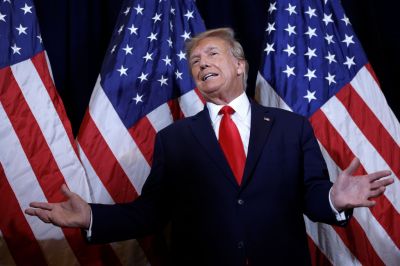One challenge of being a professional take-slinger is keeping track of the takes you’ve slung, particularly if you’re slinging them every day. When news broke last night that Donald Trump will probably soon be charged with a crime in Manhattan, the topic seemed familiar—dimly. “Haven’t I written before about the politics of a Trump indictment?” I wondered.
I had, it turns out. About 100 newsletters ago.
Another challenge is the risk of issuing conflicting takes. There’s nothing wrong with that in principle: As John Maynard Keynes (didn’t quite) put it, “When the facts change, I change my mind. What do you do, sir?” But self-contradiction violates an implied warranty of punditry, that the sage columnist sees further and with greater clarity as he gazes across the political landscape than the average Joe does.
Thinking that the politics of indicting Trump were good in November and not so good in March risks breaching the warranty and—gasp—calling that sagacity into question.
In this case there’s no contradiction, though. My point in the earlier column was that, contrary to conventional wisdom, an indictment could alienate Republican voters from Trump instead of rallying them to him. And that’s still true.
Had Trump’s candidates performed well in the midterms, the right likely would have greeted any criminal charges against him with the same contempt they showed the FBI after Mar-a-Lago was searched last summer. Their spin would have been that Trump is an electoral force and the deep state is terrified that he might return to power so they’ve taken to cooking up dubious claims of lawbreaking to justify jailing him before he can be reelected.
Instead, I suspect, watching Trump-backed candidates fumble away winnable races in November did for many what his own hotly denied defeat in 2020 never managed to do. It convinced them that he really is an electoral drag on the party. If you’re a stalwart Republican who’s spoiling to take back power in 2024 and intrigued by the new guy from Florida who won his race last year by 20 points, Trump getting indicted is no longer some sort of populist credential. It’s just more electoral baggage, another reason swing voters will cite to stick with Biden and therefore a good reason for Republicans to nominate someone else.
As fate would have it, the news that Manhattan’s district attorney seems poised to charge him with a crime appeared on Thursday evening at around the same time as a scoop from the Washington Post that DeSantis “has indicated privately that he intends to run for president, according to two people familiar with his comments.” That made yesterday a great day all around for Never Trumpers, no? Trump will soon be saddled with a new liability while his most formidable opponent is preparing for battle. A life lived without any accountability will soon face some in a courtroom. It’s just what we hoped for. In theory.
In reality, the backfire potential from the Manhattan indictment is, to borrow a term from the probable defendant, yuge.
Let’s back up.
Rewind to last November, when I was feeling optimistic. Trump faced a number of legal headaches at the time that threatened him politically in the coming cycle.
Least threatening was a civil suit filed by New York’s attorney general accusing him of having defrauded lenders and insurers by overvaluing his company’s business assets. Losing that suit would do him minimal damage with voters. Most Americans assume, not incorrectly, that the rich are forever finessing or skirting financial regulations to build their fortunes. If Trump got caught, it must be because he was more clumsy or more threatening to the left than other gazillionaires who behave the same way with impunity.
He’s used that defense successfully with Republicans before. When it came out in 2016 that he’d made a six-figure donation to the Clinton Foundation, he shrugged it off on grounds that he was simply playing a rigged game whose rules had been set by the left. If you want to succeed in business you need to engage in a certain amount of grubby behavior, like throwing money around to keep the corrupt powers-that-be off your back. Fudging the value of his assets would fall into the same category.
Still, baggage is baggage. If you’re a Republican voter who prefers DeSantis instinctively and is looking to justify that preference rationally, the fact that Trump has been accused of fraud by New York’s AG is one more way to tell yourself that your instincts are justified. Surely swing voters won’t vote for someone who’s guilty of fleecing people. (Spoiler: They will.)
Somewhat more threatening was the Justice Department’s investigation of Trump for absconding with classified material to Mar-a-Lago. Prosecuting him for that was destined to be tricky after Hillary Clinton got off scot free in 2016 despite having stored numerous classified files on her private server. But as information dribbled out about the number of documents he’d taken and how his lawyers had deceived the DOJ, outrage on the right about the probe quieted down conspicuously. What had looked at first like just another “deep-state witch hunt” began to look like another case of brazen, embarrassing Trump misconduct instead.
And unlike the civil suit in New York, this investigation can’t be dismissed as irrelevant on grounds that it involves his behavior as a private citizen. For certain Trump devotees, his conduct before he became president somehow isn’t germane to whether he should be given a second term. That’s as inane as it is convenient: Another word for how one behaves in private life is “character,” and character is—or should be—material to a candidate’s fitness for office. One virtue of the Justice Department probe, though, is that it involves Trump’s conduct as president, not as a private citizen. If you can’t count on him to be diligent about protecting state secrets then you shouldn’t want to restore his access to those secrets by reelecting him.
The most threatening investigation, however, was and remains the probe in Fulton County, Georgia, of Trump’s election tampering in that state. Only an especially brain-poisoned MAGA junkie can hear that he pressured Georgia’s Republican secretary of state in early 2021 to “find” enough votes to erase Joe Biden’s margin of victory there and conclude there was nothing more sinister in the request than conjecture that pro-Trump votes might have gone uncounted. For most Americans, I suspect, his behavior in that case falls under the heading of res ipsa loquitur. The thing speaks for itself.
The Georgia probe is the one that will do him the most damage electorally because it showcases his most disgraceful episode as president and the singular moral and civic defects that make him unqualified to serve. Other businessmen might defraud their creditors and other officials might make off with classified documents but only one person has leaned on inferior public servants to overturn a national election on his behalf. He has the soul of a mafia boss and possibly less of a commitment to America’s civic traditions than the average mafioso does. Swing voters will care about that even if the average Republican doesn’t. A lot. And the average Republican will care whether swing voters care.
In short, as of last fall, there were three investigations percolating that might do Trump some greater or lesser degree of political damage.
Would it surprise you to learn that yesterday’s news about looming charges in Manhattan relates to precisely none of them?
The Manhattan D.A., it seems, wants to indict Trump over … Stormy Daniels.
I commend this new Associated Press story to you if you need your memory refreshed about the particulars of that scandal. And you surely do need it refreshed. It was a long time ago.
How long? Long enough to encompass Michael Avenatti’s entire arc in politics. When Stormygate first got rolling, he looked poised to parlay his role as Daniels’ Trump-hating celebrity lawyer into a political career as a Resistance icon. He’s now nearly a year into his sentence in a federal pen for having stolen some of the proceeds from her book deal and has many years left to serve on other charges.
That’s a long time.
Too long to make anyone care very much if Trump does end up being indicted for the hush-money payments he made to Daniels, I fear. Those payments occurred during his first run for president; he’s now running for the third time. Voters will wonder why it took seven years to bring charges and understandably will find the timing suspicious, especially once Trump starts hollering that this is less an act of prosecution than persecution by a Democratic establishment eager to block his path to power by any possible means. He’s already doing it, in fact: “I am guilty of nothing except for the fact that I am beating all Republicans and Democrats badly in the Presidential race.”
Many will find that persuasive, and not just Republicans. Handing down an indictment months after he announced his 2024 candidacy for something he did back when Barack Obama was still president looks too convenient to be coincidental.
It gets worse. If Manhattan DA Alvin Bragg had an airtight case that assured a conviction, one could argue that moral and civic duty requires him to file charges. Whether doing so might backfire by helping Trump politically is irrelevant; if he broke the law he should take the consequences. Let justice be done though the heavens fall, as the saying goes.
But Bragg’s case isn’t airtight. Rather the opposite.
Even if Mr. Trump is indicted, convicting him or sending him to prison will be challenging. The case against the former president hinges on an untested and therefore risky legal theory involving a complex interplay of laws, all amounting to a low-level felony. If Mr. Trump were ultimately convicted, he would face a maximum sentence of four years, though prison time would not be mandatory.
…
In New York, falsifying business records can amount to a crime, albeit a misdemeanor. To elevate the crime to a felony charge, Mr. Bragg’s prosecutors must show that Mr. Trump’s “intent to defraud” included an intent to commit or conceal a second crime.
In this case, that second crime could be a violation of New York State election law. While hush money is not inherently illegal, the prosecutors could argue that the $130,000 payout effectively became an improper donation to Mr. Trump’s campaign, under the theory that because the money silenced Ms. Daniels, it benefited his candidacy.
Michael Cohen, Trump’s lawyer at the time, paid Daniels $130,000 for her silence in 2016 and was then reimbursed piecemeal by Trump. Bragg’s office claims the reimbursements were falsely characterized by Trump’s company as “legal expenses.” He’s hoping to bootstrap that misdemeanor into a minor felony by alleging that Trump’s “improper donation” constitutes a separate campaign-finance crime.
The New York Times delicately describes Bragg’s theory as “novel.” I prefer the word used by Times reporter Maggie Haberman, who’s palpably skeptical that this prosecution will pay off: “Exotic.”
It turns out that Bragg’s predecessor as Manhattan DA weighed charging Trump in this matter but ended up deciding against it, possibly because the reasoning was too “exotic” for him. Not for Bragg.
If you’re excited by the prospect of Trump finally facing criminal accountability, how excited will you be when a court tosses the felony charge on grounds that an improper campaign donation isn’t sufficient to justify it? Or when a jury concludes that it needs something more meaningful than paying off a porn star to take the momentous step of convicting a former president—and current presidential candidate—of a crime?
It takes no imagination at all to picture Trump strutting out of a Manhattan courthouse after an acquittal, crowing that he beat the “deep state” again and that the jury ratified his theory that Bragg’s prosecution was driven by politics, not facts.
But wait. It gets worse.
You may recall that Bragg nearly prosecuted Trump once before. In early 2022, mirroring the New York AG’s civil suit, it seemed his office was moving toward indicting Trump for overvaluing his business assets. But no indictment came. The two lead prosecutors on the case abruptly resigned after Bragg reportedly “indicated to them that he had doubts about moving forward with a case against Mr. Trump.” The DA’s office had tried to flip executives at the Trump Organization into testifying against Trump but failed. Bragg’s subordinates believed they had a case anyway. Bragg apparently disagreed.
“I believe that your decision not to prosecute Donald Trump now, and on the existing record, is misguided and completely contrary to the public interest,” one prosecutor wrote in his resignation letter. Last month he published a book about the case in which he all but called Bragg a coward for not moving forward with it.
And now, suddenly, here’s Bragg on the cusp of indicting Trump over l’affaire Stormy instead.
He’s still a few years away from facing the electorate in Trump-hating indigo-blue New York City but his interest in charging Trump over the hush money paid to Daniels reeks of what’s known in sports as a “make-up call” by the refs. If a referee makes a bad call against one team earlier in the game, he might try to balance the scales by making a bad call against the other team later. Facing a ton of criticism from the left for having let Trump off the hook for possible financial crimes, Bragg might be pivoting to an equally weak case involving hush money to a mistress to prove to Manhattan’s liberal voters that he’s willing to take Trump on after all.
Wait, though. It gets even worse.
Rationally, a dubious prosecution of Trump in New York shouldn’t color the public’s view of other investigations pending against him. The Stormy Daniels scandal has nothing at all to do with Trump’s election tampering in Georgia or his habit of hoarding classified material. But politics doesn’t always, or often, operate at the rational level. Especially when Trump is involved.
If he’s charged in Manhattan for paying off Daniels, it’ll be easier for him and his fans to discredit the more serious charges he may face in Georgia or in federal court by folding them all into a narrative that Democratic prosecutors are conspiring to sabotage his campaign with frivolous indictments. There’s nothing frivolous about the classified-documents case, to be sure, but it’s become politically untenable to try him on that unless Biden is also charged and tried. The Daniels prosecution might not technically qualify as “frivolous” either but the fact that Trump stands almost no chance of serving time in prison if he’s convicted there leads one to wonder what the point is.
The only probe that can hurt him legally, morally, and politically at this point, I think, is the one in Georgia. Ideally Bragg and Merrick Garland would stand down and let Fulton County DA Fani Willis take her chances.
Assuming corrupt Republicans in her home state don’t remove her from office before she can, I mean.
Some will digest all of this and counter with the example of Al Capone, a man who committed egregious crimes but ultimately went away to prison for … tax-evasion. If there’s a bad guy out there and you can put him away on a minor offense, you do it in the name of public safety. And after all, didn’t I compare Trump to a mafia boss in this very column?
I did. But Al Capone didn’t have 74 million people who voted for him in a national election. The American public of Capone’s era was, I assume, broadly unified in the belief that getting a gangster and public menace off the streets was a good cause warranting the use of any available legal means. A ticky-tack conviction would do the job just as well as a more substantial one.
The American public of the current era is not similarly unified with regard to our modern Don, to its lasting shame.
If you want to charge a former president who enjoys cultish adulation and minimize the political backlash in doing so, prosecuting him needs to look legitimate in every way. Forget minor offenses and “exotic” legal theories. Ditch cases where his political enemies committed similar wrongs without being held accountable. Draw the legal line where most Americans draw the moral line, at trying to jury-rig a coup by quietly pressuring electoral officials. For anti-Trumpers, it should be Georgia or bust.







Please note that we at The Dispatch hold ourselves, our work, and our commenters to a higher standard than other places on the internet. We welcome comments that foster genuine debate or discussion—including comments critical of us or our work—but responses that include ad hominem attacks on fellow Dispatch members or are intended to stoke fear and anger may be moderated.
With your membership, you only have the ability to comment on The Morning Dispatch articles. Consider upgrading to join the conversation everywhere.